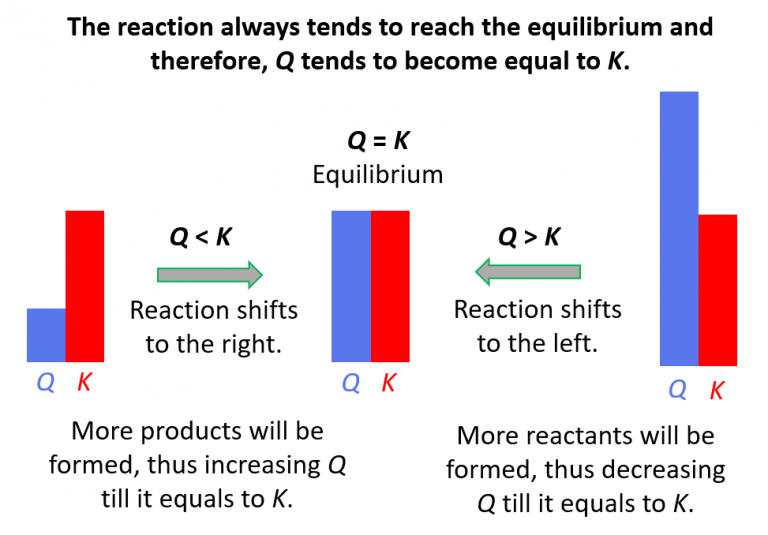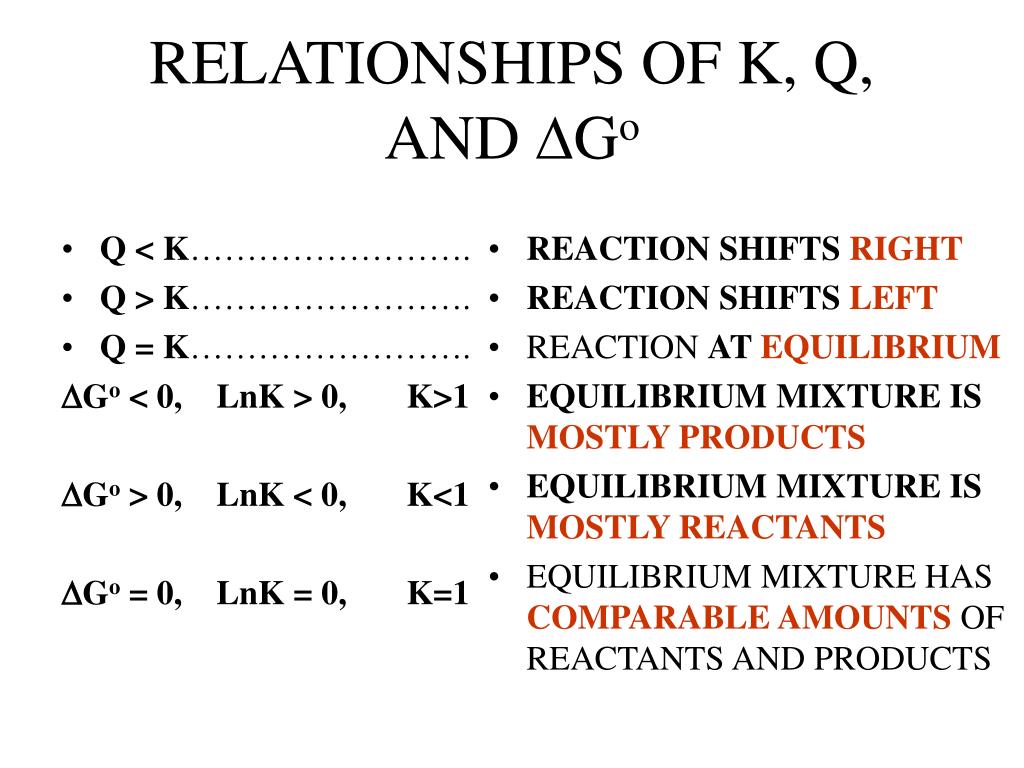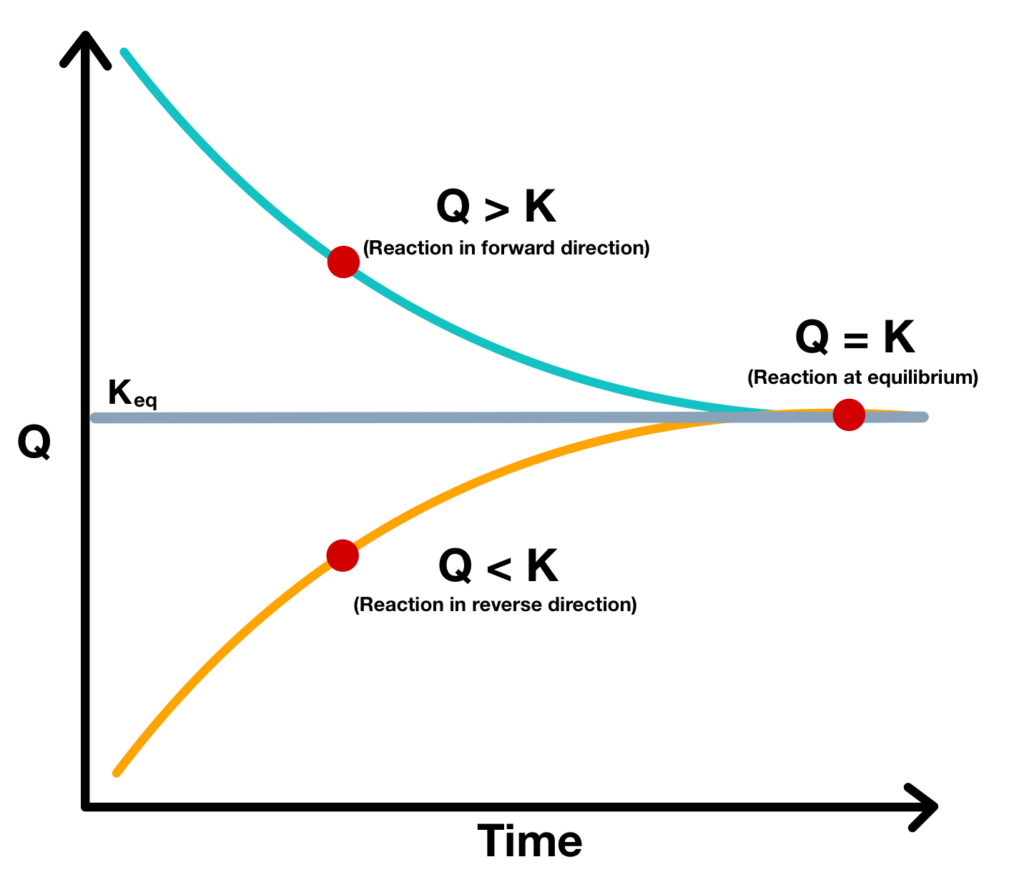Relationship Between Q And K
Relationship Between Q And K - Q can be used to determine which direction a reaction will shift to reach equilibrium. If k > q, a reaction will proceed forward, converting. The main difference between \(k\) and \(q\) is that \(k\) describes a reaction that is at equilibrium, whereas \(q\) describes a reaction. Q and k are used to describe the state of equilibrium in a chemical reaction. The reaction constant or reaction quotient is denoted by the letter “q” in any equilibrium reaction. K represents the equilibrium constant, which is. The equilibrium constant is denoted by the letter “k” in.
The main difference between \(k\) and \(q\) is that \(k\) describes a reaction that is at equilibrium, whereas \(q\) describes a reaction. The equilibrium constant is denoted by the letter “k” in. If k > q, a reaction will proceed forward, converting. Q can be used to determine which direction a reaction will shift to reach equilibrium. Q and k are used to describe the state of equilibrium in a chemical reaction. K represents the equilibrium constant, which is. The reaction constant or reaction quotient is denoted by the letter “q” in any equilibrium reaction.
If k > q, a reaction will proceed forward, converting. The equilibrium constant is denoted by the letter “k” in. Q and k are used to describe the state of equilibrium in a chemical reaction. The main difference between \(k\) and \(q\) is that \(k\) describes a reaction that is at equilibrium, whereas \(q\) describes a reaction. K represents the equilibrium constant, which is. Q can be used to determine which direction a reaction will shift to reach equilibrium. The reaction constant or reaction quotient is denoted by the letter “q” in any equilibrium reaction.
Reaction Quotient Q Chemistry Steps
The reaction constant or reaction quotient is denoted by the letter “q” in any equilibrium reaction. The main difference between \(k\) and \(q\) is that \(k\) describes a reaction that is at equilibrium, whereas \(q\) describes a reaction. If k > q, a reaction will proceed forward, converting. The equilibrium constant is denoted by the letter “k” in. K represents.
The Difference between Q and Keq (Equilibrium) YouTube
K represents the equilibrium constant, which is. Q and k are used to describe the state of equilibrium in a chemical reaction. The equilibrium constant is denoted by the letter “k” in. If k > q, a reaction will proceed forward, converting. The reaction constant or reaction quotient is denoted by the letter “q” in any equilibrium reaction.
PPT Chemical Equilibrium PowerPoint Presentation, free download ID
If k > q, a reaction will proceed forward, converting. The main difference between \(k\) and \(q\) is that \(k\) describes a reaction that is at equilibrium, whereas \(q\) describes a reaction. Q and k are used to describe the state of equilibrium in a chemical reaction. The equilibrium constant is denoted by the letter “k” in. The reaction constant.
PPT CHEMICAL EQUILIBRIUM PowerPoint Presentation, free download ID
The reaction constant or reaction quotient is denoted by the letter “q” in any equilibrium reaction. Q and k are used to describe the state of equilibrium in a chemical reaction. K represents the equilibrium constant, which is. Q can be used to determine which direction a reaction will shift to reach equilibrium. The equilibrium constant is denoted by the.
Explain the Difference Between K Kp and Q LarryhasPark
The main difference between \(k\) and \(q\) is that \(k\) describes a reaction that is at equilibrium, whereas \(q\) describes a reaction. Q can be used to determine which direction a reaction will shift to reach equilibrium. Q and k are used to describe the state of equilibrium in a chemical reaction. If k > q, a reaction will proceed.
What Is Kc In Chemistry slideshare
Q can be used to determine which direction a reaction will shift to reach equilibrium. Q and k are used to describe the state of equilibrium in a chemical reaction. The equilibrium constant is denoted by the letter “k” in. K represents the equilibrium constant, which is. If k > q, a reaction will proceed forward, converting.
Establish relationship between Kp Kc?
K represents the equilibrium constant, which is. The main difference between \(k\) and \(q\) is that \(k\) describes a reaction that is at equilibrium, whereas \(q\) describes a reaction. The reaction constant or reaction quotient is denoted by the letter “q” in any equilibrium reaction. The equilibrium constant is denoted by the letter “k” in. If k > q, a.
Reaction Quotient (K) and Equilibrium Constant (K) Problems & Examples
Q can be used to determine which direction a reaction will shift to reach equilibrium. If k > q, a reaction will proceed forward, converting. Q and k are used to describe the state of equilibrium in a chemical reaction. The equilibrium constant is denoted by the letter “k” in. The main difference between \(k\) and \(q\) is that \(k\).
Reaction Quotient (Q) Equation, Calculation, Types, Units
Q can be used to determine which direction a reaction will shift to reach equilibrium. K represents the equilibrium constant, which is. Q and k are used to describe the state of equilibrium in a chemical reaction. The equilibrium constant is denoted by the letter “k” in. The main difference between \(k\) and \(q\) is that \(k\) describes a reaction.
Relationship between q k and q for different values of Δ (m = 4
Q can be used to determine which direction a reaction will shift to reach equilibrium. K represents the equilibrium constant, which is. Q and k are used to describe the state of equilibrium in a chemical reaction. The equilibrium constant is denoted by the letter “k” in. The main difference between \(k\) and \(q\) is that \(k\) describes a reaction.
The Equilibrium Constant Is Denoted By The Letter “K” In.
Q and k are used to describe the state of equilibrium in a chemical reaction. If k > q, a reaction will proceed forward, converting. K represents the equilibrium constant, which is. The main difference between \(k\) and \(q\) is that \(k\) describes a reaction that is at equilibrium, whereas \(q\) describes a reaction.
The Reaction Constant Or Reaction Quotient Is Denoted By The Letter “Q” In Any Equilibrium Reaction.
Q can be used to determine which direction a reaction will shift to reach equilibrium.








